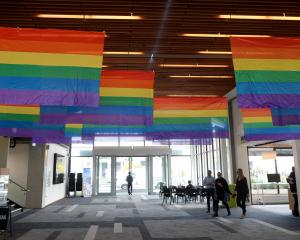The Dunedin City Council, through its hearings committee, has decided to allow two Orientation 2013 events this week at Forsyth Barr Stadium to go to midnight. Because of the noise level, resource consent was required for beyond 11pm.
The OUSA accepts a balance is required between several different segments of the citizenry of Dunedin and their competing demands. I want to lay out the main points of our position as a contribution to the communication the OUSA believes is needed so that negative effects of noise are minimised.
The OUSA was established in 1890, has 50 core staff and a core volunteer complement of 500. Paid staff numbers spike at key times, like Orientation, to 100, as we use many people, including students, on short-term contracts to access the expertise and labour required for such large undertakings.
In addition, we have specialist contractors providing services in many areas of expertise, including sound, lighting and traffic management.
A highly professional approach is taken to OUSA activities in line with the demands of students, who are members, and the leaders of their students' association. Dunedin is the premier student city in New Zealand. We have high concentrations of students in small areas and a high proportion of people who come to Otago University from outside the region.
Recently, the Otago Daily Times published a front page story about the iD fashion week bringing in $1.8 million to the city. The 2011 economic impact of the university was $1.42 billion and that of the polytechnic $206 million. A 1% drop in enrolments is economically the same as a fashion week.
The point is that very small shifts in student preferences for institutions matter a great deal. One of the consequences of inviting 25,000 mostly young people to Dunedin, who then constitute about 20% of the citizens, means that students have a legitimate and strong voice, one that is stronger than in any other city in New Zealand.
Hence, we argue that there ought to be a higher noise tolerance for Orientation in this premier student city during that premier student week.
The OUSA points out that, because of the overlay of encouraging pro-social choices through event design and health and safety systems, our events reduce the risk of negative outcomes during this period. Over many years, reports in the ODT show various authorities praising the OUSA for the outcomes of its events. Last year was the first year we used Forsyth Barr Stadium. We made communication mistakes. We didn't tell the wider public effectively when events were on and when they would end. That would have increased anxiety.
This year, we are doing a better job.
For the first time, the Orientation magazine has been published in partnership with the ODT and sent out to all readers of the ODT, which is a sizeable part of the population. Actually, the debate about hours of operation featured in the ODT, and this also supports the communication. We also have worked with the Dunedin City Council on wording for public notices and, crucially, conducted a letter drop to the most affected suburbs, which were identified according to the number of complaints received in 2012. The OUSA is aware that effective communication in 2013 may perversely increase complaints as most people will know the OUSA is responsible.
Some people might say that just because they are young, students don't need to attend events until midnight. It is true that most events held at the stadium finish before 11pm, but that is because they are targeted at a more senior segment of the population. The Hollies, Elton John and Paul Simon are all specifically enjoyed by those over 40. There is nothing wrong with that; I aspire to join the seniors in due course. However, it points to how the noise rules mean that a major asset of the city becomes unavailable for practical use by a significant segment of its citizens who paid for it - and students do pay their rates through their rents.
And with 20% of the population being students, the centre of gravity of what is reasonable does shift towards student preferences, which on average are more liberal towards noise levels and later hours of operation. In our view, a midnight finish during Orientation Week balances the reasonable needs of all parties. It recognises that students are a significant economic and citizen component of Dunedin, whose desires ought to carry weight, particularly for the premier orientation in New Zealand during the premier student week of the year, in this the premier student city in New Zealand.







